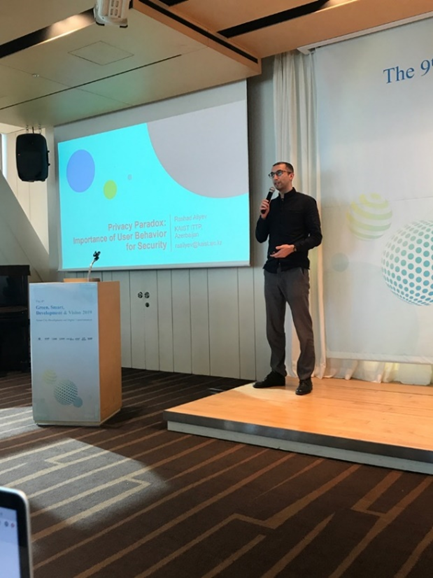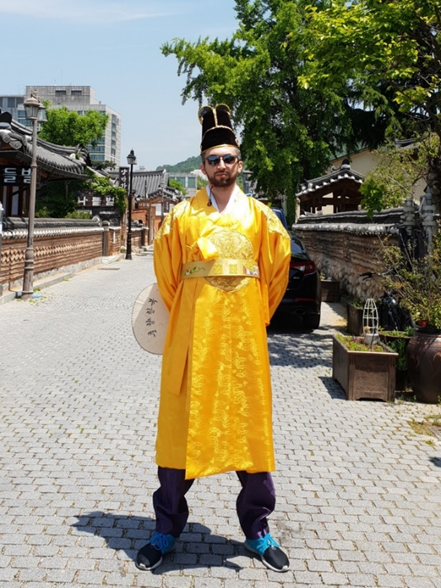Alumni Stories
Towards the future, Together with the World
- Rashad Aliyev (Azerbaijan)
- UI/UX
- 2022-05-12 00:00:00
- 543
Admission: 2018 Spring ITTP Ph.D Program
Affiliation: ADA University(ÖzünÖyr?n)
Position : Instructor Computer Science, Co-founder
“What makes it even more powerful and effective is the awareness that all of my seniors, our alumni, as well as those who will join GITTP in the future, can all connect to each other through this experience, understanding, and familiarity with the culture, history, and people of Korea.”
Dear alumni and friends of the GITTP family, please allow me to greet you and express my gratitude for the chance to express and communicate some of my thoughts and experience. I am Rashad Aliyev from Azerbaijan. I joined the GITTP family in the Spring of 2018. It is my fourth year at GITTP, and I guess that is long enough for me to reflect on my experience and impressions as a Ph.D. student at KAIST.
I come from Azerbaijan – a multicultural country with many ethnicities, languages, and religions. I myself belong to the Lezgi ethnicity, but since our society is multicultural, from my young age I have had the privilege to speak multiple languages in addition to Azerbaijani and Lezgi. Probably that’s how my interest towards other cultures, especially towards oriental philosophy has started. Luckily, I was able to get admitted to KAIST for my bachelor studies at the age of 17, and started my exploration of Korean culture quite early. So, as you can guess, joining GITTP was not my first time to come to Korea and KAIST. Nevertheless, my experience as an undergrad at KAIST, and as a graduate student at the GITTP was very different.
The earliest feeling, I can remember associating with Korea was that of gratitude. It was a very pleasant and unexpected surprise to see how much support and opportunity was provided towards my education in Korea. Of course, this included the fact that all students were supported by a monthly stipend, but also things like exposure to people and cultures from all over the globe. Even with all the good stuff, life as an undergrad at KAIST was quite tough for two main reasons. First, KAIST is a tough school with very high academic standards and requirements, and that is something good. But the second reason is that there was very little chance for cultural exposure in Korea. To be honest, I felt like I have spent all four years inside the KAIST campus, and had very little idea about what kind of a country I am in, what kind of people live here. I had to exert a lot of directed and conscious effort to begin to understand the traditional cultural values of Korea, the meaning of respect, social hierarchy, power dynamics, even the body language. But I still had no idea about what is outside the campus.
Luckily, I was given a second chance to return to KAIST as a graduate student at the GITTP. Seeing culture and history related courses offered as a part of a graduate program for engineering and management was unusual at first. Now, looking back at the knowledge and experience I have gained through various Korean culture and history classes, trips, site visits, extra-curricular lectures, I can see the overwhelming role that familiarity with the cultural context of a country can play in the depth and quality of understanding. And this applies to both academic and business settings. What makes it even more powerful and effective is the awareness that all of my seniors, our alumni, as well as those who will join GITTP in the future, can all connect to each other through this experience, understanding, and familiarity with the culture, history, and people of Korea. This serves as a firm support and facilitating medium for the academic and industrial cooperation GITTP family members can create.
Next, I would like to share some important insights and lessons I have come to learn as a student of Korean culture. I am sure most of GITTP members will relate to what I have to say.
A Culture of Respect: While respect for the human being is one of the fundamental building blocks for most cultures around the globe, being exposed to Korean culture allowed me to experience and learn to understand various subtle nuances of the role mutual respect plays in the society. I used to be very selective when it comes to listening and learning from others, leading to a relatively closed mindset that is not open for change. One thing I came to love and appreciate about Korean culture is the default level of high respect one learns to exercise towards others, and expect the same from others. This is especially beneficial and helpful when one gets used to be patient, reserved, and able to listen and learn more while talking less, especially when interacting with people who are older or have more experience (e.g. professors). When I adopted this culture and started practicing it, I quickly noticed how much more willing people are to help, assist, motivate me towards my goals and growth in general. This aspect of Korean culture helped me become a more patient person who can listen and learn better.
Saying no to Procrastination: “Balli-balli” is a phrase every foreigner in Korea learns very quickly. While translated as “quick-quick”, it refers to the tendency to get things done fast. It is one of my favorite aspects of Korean culture and attitude. While there definitely are areas of life where we should take our time, take it slow, in modern times procrastination has become a great hurdle on the path to growth and development. I tend to relate the idea of “Balli-balli” to the famous “fail fast, learn faster” mentality that is well-known in entrepreneurial communities all over the globe. It is important not to take it to the extreme, but for me, the “balli-balli” attitude is an effective support to getting things done. It is nice to find myself as a part of a social structure that continuously provides reminders and motivates me to remember what is my target, my goal, and what I have to do at this very moment to get closer to achieving it.
Making Writing a Habit: I still remember very well how my father did his best to encourage me to write a lot, be it my plans for tomorrow, school homework, or different ideas I may have while daydreaming. I was pleasantly surprised to see how important writing is in Korean culture. Starting with the way people treat, respect, and celebrate their alphabet (Hangeul), up to the very prevalent culture of journaling, taking notes. I will never forget how impressed I was when during a GITTP site visit to one of the old palaces in Korea, I was shown a special building that was in the middle of the whole structure, much higher than anything else, and with some protection mechanisms. I was impressed because this building was the best protected one, it was used to store scriptures, documents, records. And it was given no less importance than that given to the king’s family. There was a great lesson to be learned in the attitude towards historical records and manuscripts in Korean history. Only through recording what is important for future generations can we ensure preservation of values and transfer of knowledge. Isn’t that the essence of academic life?
Finally, I really love the culture of humbleness in Korea. It helps me remember that there is always someone I can learn from, no matter what I achieve myself. Having such awareness keeps me continuously motivated and in search of people from whom I can learn.




- 이전
- Feroz, Abdul Karim (Afghanistan)
- 2022-05-12
- 다음
- Mekuria Teklemariam (Ethiopia)
- 2022-05-12
